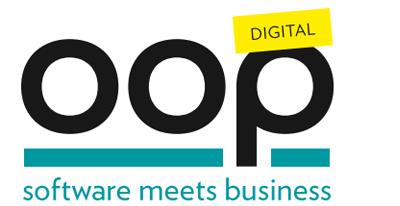
Conference Program
Please note:
On this site, there is only displayed the English speaking sessions of the OOP 2022 Digital. You can find all conference sessions, including the German speaking ones, here.
The times given in the conference program of OOP 2022 Digital correspond to Central European Time (CET).
By clicking on "EVENT MERKEN" within the lecture descriptions you can arrange your own schedule. You can view your schedule at any time using the icon in the upper right corner.
Thema: Software Engineering
- Montag
31.01. - Mittwoch
02.02. - Donnerstag
03.02.
Functional programming is the future of software development. As software gets ever more complex, unintended side effects flourish - you push on one side, and something unexpected squirts out the other. Functional programming cuts down on complexity through high-level abstractions and avoids unintended side effects through pure functions. The result is simple and elegant code that captures the essence of the problem you're trying to solve. Fortunately, functional programming is easy to learn,…
Chaos engineering, popularised by Netflix, is an approach to building scalable, resilient systems through destructive experiments, but what other impacts does it have? How can adopting chaos engineering change organisational culture? This talk explores the parallels between modern distributed architectures and the unpredictable challenges of the modern world, and how approaches like chaos engineering help organisations deal with both.
We will deep dive into the practices needed to make chaos…
Digitalization has been changing existing industry B2B businesses, digitalization business models arrived and the Digitalization solutions need to be developed to support this. The sudden enforcement of social distancing has given the digital transformation a significant push forward. How do we develop innovative Digitalization offerings in the future? We will show how to seize these opportunities and forge new paths toward the new normal for Software Engineering.
Target Audience: Software…
Each project has its own unique technology stack, different business logic and a unique team. The definition of quality in our projects can vary greatly. However, there are good practices that will work everywhere. There are steps that can be taken in every project and team to produce the software of better quality. I will tell you how to improve communication and processes, and what tools we can use not to be ashamed of the fruits of our work. Everything from a programmer's perspective.
Target…
“TDD is when you write tests before implementing the business logic” - a simple sentence that is also often misunderstood.
Moving from one project to another, I have observed how many times people were terrified of TDD. I have been there too.
This session will focus on trying to understand HOW and more importantly WHY you should consider TDD. I've transformed failures from my experience into a series of lessons learned, things that in hindsight should have been obvious.
Target Audience: Architects,…
In this talk, we will give an overview about all the different aspects that affect climate change from the software engineering perspective and discuss a number of concrete actions that every software engineer can take (and should keep in mind day-in day-out) to help fight climate change. During the talk, we will not only provide an overview of the landscape, but also cover topics in more depth and discuss the challenges that come with them.
Target Audience: Architects, Developers, Project…
In 2020, the three big cloud providers signed us all up for a revolution in the way we write and operate software. The deadline is 2030. Are you ready?
Target Audience: General techie. This works for all
Prerequisites: None
Level: Advanced
Extended Abstract
In 2020, Google Cloud, AWS, and Azure all committed to be carbon zero by 2030. It's the incredibly tough goal of zero emitted carbon as a result for operating our applications and services. They can't do it alone. AWS says "we optimize for…
When breaking up our software into modules we all too often forget the important social aspects; how the design affects the teams. We need modules that not only make us efficient but also harmonious.
We know that good fences make good neighbours, but only when the boundaries are placed correctly. We are going to take a closer look at why modularity is needed, what it actually can do for us, and how we can increase our chances of getting it right by taking a systems thinking approach.
Target…
